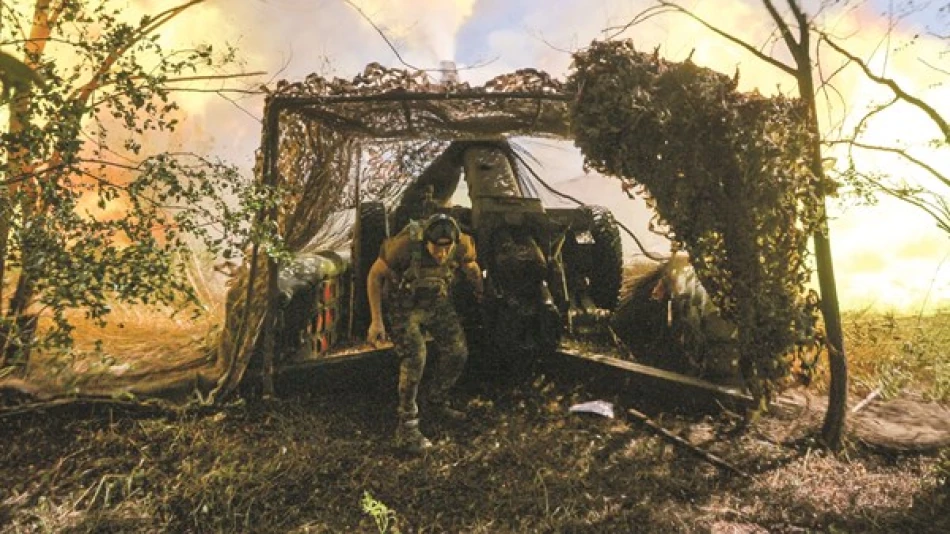
Trump's Deadline Expires: US and Russia Seek Ceasefire in Ukraine
Trump's Ukraine Gambit: Washington and Moscow Edge Toward Ceasefire Deal as Presidential Summit Looms
American and Russian officials are reportedly working behind the scenes to forge a ceasefire agreement in Ukraine, setting the stage for a potentially pivotal summit between Presidents Donald Trump and Vladimir Putin next week. The diplomatic maneuvering comes as Trump's self-imposed deadline for ending the war expires, yet signals from both Washington and Kyiv suggest momentum is building toward freezing the conflict along current battle lines.
The Diplomatic Chess Game Intensifies
According to Bloomberg sources, the preliminary framework would see Russia halt its offensive operations in the Kherson and Zaporizhzhia regions, effectively freezing the conflict where front lines currently stand. While a White House official dismissed the Bloomberg report as "speculation," Ukrainian President Volodymyr Zelensky's subsequent statement appeared to validate the diplomatic activity, emphasizing that "the United States is determined to achieve a ceasefire."
This marks a significant shift from the maximalist positions both sides have maintained throughout the nearly three-year conflict. Russia has consistently demanded control over four Ukrainian regions—Luhansk, Donetsk, Zaporizhzhia, and Kherson—plus the Crimean Peninsula. Ukraine has rejected any territorial concessions as capitulation to aggression.
Trump's High-Stakes Diplomacy
The reported negotiations represent Trump's most concrete diplomatic initiative since returning to the White House in January with promises to rapidly end the Ukraine war. His special envoy Steve Witkoff spent three hours in talks with Putin in Moscow last Wednesday, with both sides describing the discussions as "constructive."
Trump's approach mirrors his transactional diplomatic style from his first presidency, particularly his direct engagement with North Korea's Kim Jong Un. However, the Ukraine conflict presents far greater complexity, involving NATO allies, European security architecture, and billions in military aid commitments.
The Sanctions Sword of Damocles
Trump's deadline for Russia to end the war expired without immediate consequences, though he had threatened new sanctions on Moscow and countries purchasing Russian exports. The absence of fresh punitive measures suggests the administration may be betting on diplomatic progress rather than escalating economic pressure.
European Allies Cautiously Optimistic
Polish Prime Minister Donald Tusk, one of Ukraine's staunchest supporters, offered the most explicit assessment of ceasefire prospects following talks with Zelensky. "There are definite signals that freezing the conflict... may be closer, and there are hopes for that," Tusk stated, describing the Ukrainian president as "very cautious but optimistic."
Tusk's comments reveal European anxiety about being sidelined in any Trump-Putin agreement. Ukraine's insistence that Poland and other European nations play roles in ceasefire planning reflects concerns about a bilateral US-Russia deal that could undermine European security interests.
Market and Strategic Implications
A Ukraine ceasefire would reshape global energy markets, potentially easing commodity price volatility that has persisted since Russia's 2022 invasion. European defense stocks, which surged during the conflict's early phases, could face pressure if military aid commitments wind down.
However, any frozen conflict scenario would likely require sustained Western security guarantees for Ukraine, similar to the Korean Peninsula model. This could mean continued elevated defense spending across NATO countries, particularly those bordering Russia.
The Precedent Problem
A ceasefire that leaves Russian forces controlling Ukrainian territory would establish a troubling precedent for territorial acquisition through military force. China's approach to Taiwan, and other potential flashpoints worldwide, could be influenced by how the international community responds to any Ukraine settlement.
The challenge for Trump will be selling any agreement as victory rather than capitulation, both to domestic audiences and Ukrainian allies who have sacrificed enormously. Success will likely depend on robust security guarantees and reconstruction commitments that demonstrate long-term Western commitment to Ukrainian sovereignty, even within reduced borders.
Most Viewed News

 Layla Al Mansoori
Layla Al Mansoori






